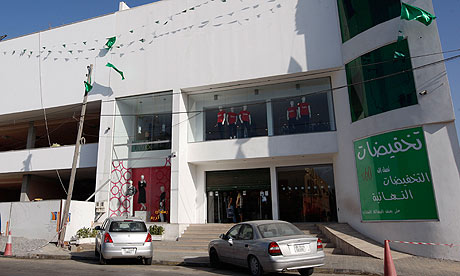Libyan attacks aimed to force out 'Zionist' Marks & Spencer
Anti-semitic smear campaign by Libyans 'at the highest levels' risked damaging ties with UK, embassy warned

A Marks & Spencer store in Tripoli was subjected to a "repugnant anti-semitic" smear campaign by the Libyan government in an attempt to force its closure, according to US embassy cables released by WikiLeaks.
The row became so violent that US officials were warned by Libyan government contacts that at least one high-ranking businessman backing the franchise could be murdered in a faked car crash.Attacks on the British retailer by Libyan officials "at the highest levels" risked causing irretrievable damage to bilateral ties with the UK, the US embassy in Tripoli warned Washington in 2008.
The memo described the "ongoing drama surrounding efforts by the UK government and investors to keep open the Marks & Spencer retail store in Tripoli, and a campaign by some Libyan government officials to close it."M&S opened the Tripoli store – its first in Africa – in April 2008 and the franchise is still operating today. But after its launch the store was subjected to what the cable described as "persistent anti-Semitic rhetoric" by the Libyan government. There were accusations that M&S was a "Zionist entity" with Jewish origins, that supported Israel and "the killing of Palestinians".
The store was temporarily closed by Libyan authorities at least twice, and employees were repeatedly taken in for official questioning and put under "close scrutiny" by security officials who, the ambassador warned, were used as a "strongarm adjunct in this political play".
In truth, the report revealed, the row was "largely due to a personal grievance" between two Libyans: the prime minister and a prominent businessman.
The cable warned of a "genuine threat" of personal harm to the businessman, who the Guardian is not naming, by "old guard regime figures".
The report cited a well-placed embassy commercial contact who had received a death threat directed at the businessman from state security officials.
"Telling our contact that 'in the old days we would just arrest [the businessman]', they offered that they would instead 'clip him down to nothing' by dismantling his business empire piecemeal and undertaking a campaign to diminish his business influence," the embassy said. "They then noted darkly that if those methods proved insufficient, they would see to it that [the businessman] was involved in a fatal car accident."
The memo warned that "the fate of the store and the businessman are closely intertwined, and the ensuing test of wills reportedly has the potential to end in violence. The UK embassy, which is closely involved, has flatly told us they view the ultimate outcome of the case as an important bellwether of the investment climate in Libya and will advise potential UK investors accordingly."
The memo was written shortly after the General Union of Chambers of Commerce and Industry – which claims to represent all private and foreign businesses in Libya – called on the government to close the shop. The group expressed "strong reservations" over a visit to the store by Mike O'Brien, the British trade minister, and Thomas Vincent Fean, the British ambassador to Tripoli.Claiming that M&S was "well-known among Libyans and other Arab and Muslim peoples for its strong support of Israeli occupation of Palestine and the huge funds it provides for killing of Palestinians and constructing of illegal settlements in occupied Palestine",the chambers said "the very mentioning of Marks and Spencer is considered by Libyans as an insult to their national feelings" and "an attack on their national feelings".
The claims were denied by Fean at a press conference at the time. Asked why he and O'Brien had visited the store, he replied: "My suit is Marks & Spencer, my shirt is Marks & Spencer and I was brought up to buy Marks & Spencer. We went there without seeking the attention of the media, so we didn't intend to make any publicity for the shop."
The leaked cable cited a local business contact "with good secondhand knowledge of the situation" who reported that the prime minister, Al-Baghdadi Ali al-Mahmoudi, had become directly involved in the row. Unless the franchise was sold to unspecified government officials, the source reported the prime minister as saying, it would "suffer an immediate freeze on further import of stock and be closed permanently by year's end".
In a section of the report titled "How did it come to this?", the memo said: "In typical fashion, while the government of Libya's public criticism has comprised pseudo-populist rhetoric against "the forces of Zionism", the crux of the matter is in fact about personal relations and politics."
The businessman's "acrimonious relationship" with the Libyan prime minister was well known at the time, the report added. He had been arrested in 2007 in a government crackdown on alleged monopolistic business practices.
Marks & Spencer told the Guardian: "M&S is a secular organisation embracing all cultures, nationalities, races and religions. We do not support or align ourselves to any countries, nations, states, governments, political parties or religious bodies."

No comments:
Post a Comment